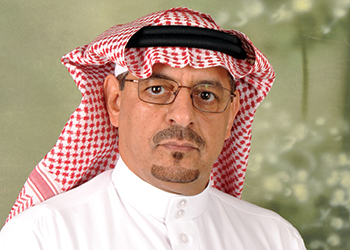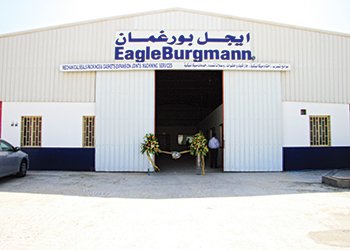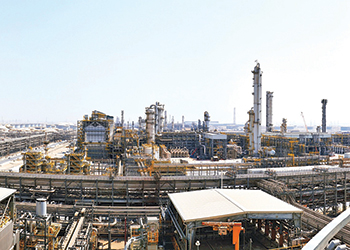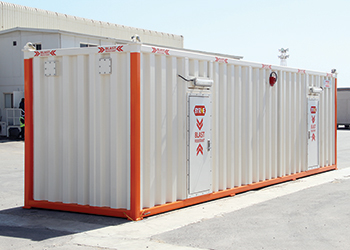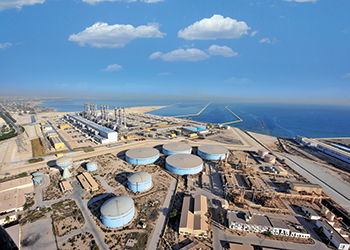
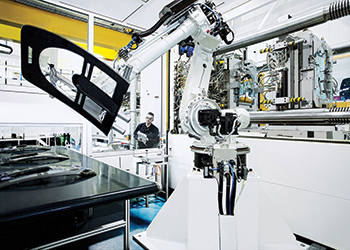 Sabic ... major presence in the industrial cities
Sabic ... major presence in the industrial cities
The major’s plants at Jubail and Yanbu are raising capacity or diversifying their output streams
Sabic has a number of projects planned or under way in Jubail and Yanbu.
A $2 billion elastomer project is a JV of Sabic and ExxonMobil Chemical being built at Al-Jubail Petrochemical Co. (Kemya).
The project will produce about 400,000 tpy of carbon black, rubber and thermoplastic speciality polymers. ExxonMobil is providing the technology and the products will be sold to local and international markets. (Carbon black is used by the automotive industry to add strength to plastic and rubber products).
Another project is Sabic’s methyl methacrylate (MMA) venture with Mitsubishi Rayon subsidiary Lucite. The Alpha-2 JV has a 250,000-tpy MMA plant in the kingdom on stream since 2014. About 80 per cent of the MMA is used in construction and automotive industries.
Riyadh is hoping that building downstream facilities will attract global car-makers such as Toyota and General Motors to set up vehicle assembly plant in Saudi Arabia. It is not just Saudi Aramco and Sabic which are developing downstream projects. Many of the kingdom’s private chemical firms are expanding.
Sabic affiliates have raised polyolefin and polymer production, including a propane dehydrogenation (PDH) plant at Ibn Zahr, and a polyethylene terephthalate (PET) plant at Sharq. In parallel, Sabic has a 50-50 a JV with Sinopec in China, which has raised the firm’s output by about 3.2 mtpy.
Their JV’s $3 billion complex at Tianjin, in north-eastern China, was completed in first week of October 2009. The complex produces basic plastics, including PE and PP; EG used in production of polyester fibres; and butadiene, phenol, and butene, used in production of polycarbonate.
China is an important market for fuels and chemicals, with SA having an integrated refining and olefins complex built at Fujian in a JV involving ExxonMobil and Sinopec. The 160,000 bpd expansion at the Fujian refinery began full operations in late 2009.
The Saudi Arabian General Investment Authority (Sagia) has processed almost $100 billion in investment in the kingdom’s petrochemical industry. This is over a third of the $270 billion for the kingdom’s power generation, petrochemicals and water desalination.
Arabian Petrochemical Co (Petrokemya), 100 per cent owned by Sabic, has the Gulf region’s first acrylonitrile butadiene styrene (ABS) plant built at its Jubail olefins complex, with a capacity of 200,000 tpy on stream since mid-2011.
It has a polybutediene plant, a latex unit, a higher rubber graft facility, a styrene acrylonitrile plant and an ABS compounding unit. The technology for this was supplied by Sabic Innovative Plastics, formerly known as GE Plastics, which Sabic acquired in 2007. Butadiene, acrylonitrile and propylene feedstock for the facility are sourced directly from Petrokemya.
Petrokemya went on stream in Jubail in 1985. Its product range and capacities have been expanded since then to include 1.95 mtpy of ethylene; 100,000 tpy of polystyrene; 70,000 tpy of benzene; 70,000 tpy of butadiene; 100,000 tpy of butene-1; and varying quantities of vinyl chloride monomer (VCM) and styrene.
The Phase-5 expansion of Ar-Razi’s methanol complex at Jubail started up in June 2008, making it the world’s largest chemical methanol production facility.
The $600 million plant, built by Mitsubishi Heavy Industries (MHI), added 1.7 mtpy of capacity at the complex, bringing its total output to 4.7 mtpy.
Set up in 1979, Ar-Razi is a 50:50 JV of Saudi Methanol Co, a consortium of major Japanese firms led by Mitsubishi Chemical Gas Co, and Sabic which is now the world’s second largest methanol producer. Methanol, often derived from methane, is used to produce other chemicals such as formaldehyde.
All of Sabic’s plants at Jubail and Yanbu’ keep raising capacity or are having their output streams diversified. Their plants are mostly JVs between Sabic and foreign firms. Sabic and partners in Jubail and Yanbu’ produce more than 45 kinds of petrochemicals and other products.
Saudi Petrochemical Co (Sadaf), a Sabic-Shell JV in Jubail, has re-launched its 600,000 tpy styrene plant.







































































